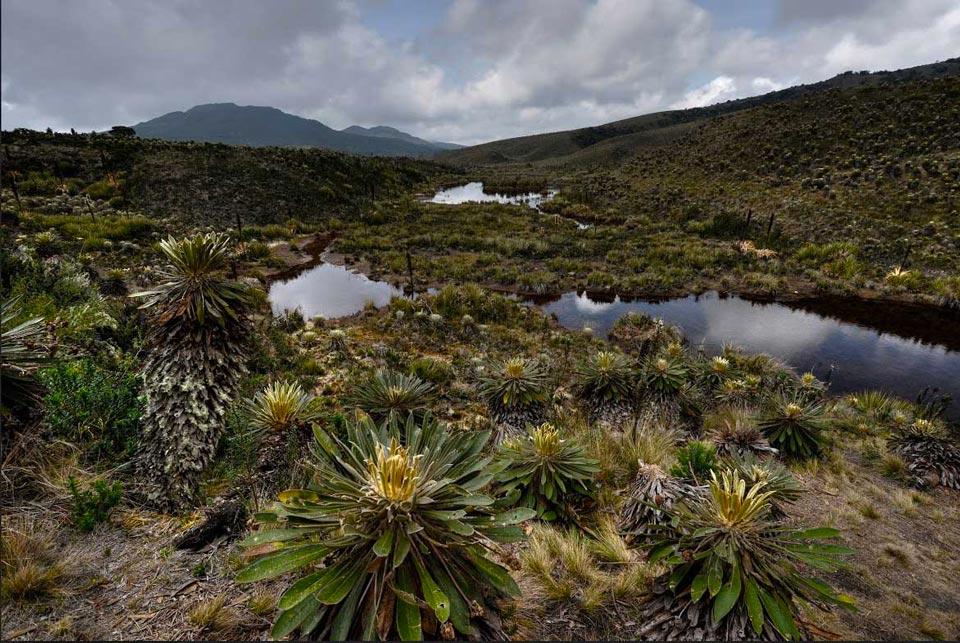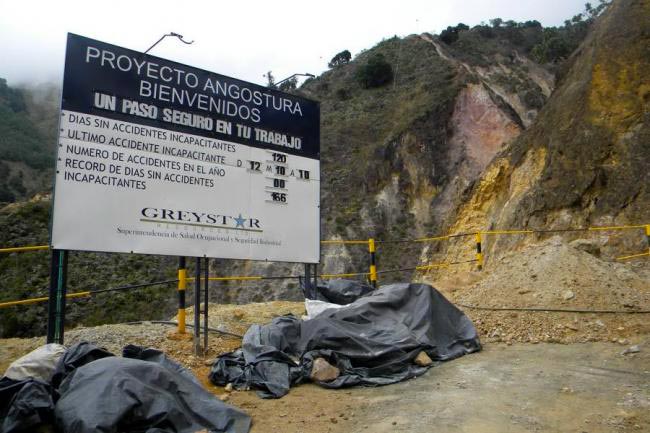
Colombia’s páramos are a vital ecosystem, providing 85% of fresh water.
With three international mining companies including Eco Oro threatening to sue Colombia, Julian Kircher takes a look at a classic case of green vs gold, as environmental ethics tangle with economic expansion
The mining industry accounts for about 7% of Colombia’s GPD, and has been one of the driving forces behind the country’s growth over the past decade.
According to a report from BN Americas, foreign direct investment in the mining sector sank to USD$533 million in 2015; the first time the figure has been below USD$1 billion in more than a decade.
While the country has a wealth of resources, the industry has been affected by the activities of guerrilla groups and BACRIMs in rural areas – putting both operations and personnel at risk – as well as the prevalence of illegal mining, a complicated bureaucratic structure and a global industry slowdown.
The report states, “Colombia’s regulatory framework has confounded mining companies with tricky rules for obtaining environmental permits despite serious government efforts to reform and clarify the requirements and the institutions responsible for enforcing them.”
This is certainly the case in the ongoing dispute with Canadian mining company, Eco Oro.
In March this year, Eco Oro announced that if they could not reach an amicable settlement with the Colombian government over its rights to exploit its Angostura Project located in Santander, they would take the dispute to international arbitration. The company upped the ante on July 22 by announcing a USD$14 million investment deal with Tenor capital.
“With this investment, Eco Oro will be completely funded to the extent we are unable to resolve the dispute amicably with the Government of Colombia and, instead, decide to move forward with arbitration”, said Mark Moseley-Williams, president and chief executive officer of the Company.
The Angostura project dates back to 1995 when Eco Oro (then called Greystar Resources) began their exploration programme. Since then, there have been a number of changes to the law, leading to a series of environmental impact assessments and legal challenges to the company’s activities.
Part of the dispute stems from confusion over where exactly the boundaries of the páramo – a protected ecosystem – actually are, and the legal status of Eco Oro’s ‘special permissions’ to carry out their activities there.
The first nail in the coffin for Eco Oro’s activities came in February, when Colombia’s constitutional court ruled that all mining in the páramos was illegal. Previously, companies had been operating under a loophole that exempted mining licenses issued before February 2010. The court deemed these exceptions ‘unconstitutional’ and cited the ecological importance of the páramos, including their role in providing 85% of the country’s drinking water.
The National Mining Agency said that 473 titles would be affected by the ruling, 284 of which are currently in operation. Eco Oro is the first to announce it will take legal action, but business analysts suggest they will not be the last.
This type of company vs state dispute is becoming increasingly common. Free trade agreements allow big corporations to take on governments when local laws or rulings go against commercial agreements.
This is one of three investment disputes that are in the pipeline against Colombia. Canadian and US companies Cosigo Resources and Tobie Mining & Energy are suing for USD$16.5 billion (the amount their experts valued the gold deposits for) plus costs. The companies lost their mining concession after the area in Taraira (near the border with Brazil) where they had planned to mine was designated as a national park.

Previously Greystar, Eco Oro’s Angostura mining interests have been hanging in the balance since a Colombian court ruled that the páramos were to be protected.
In March, Swiss coal giant Glencore announced that it would sue Colombia after the government moved the goalposts on the permits for their Calenturitas and La Jagua mines.
In the case of Eco Oro, the company objects to the “unreasonable delay” in clarifying the boundary of the Santurbán Páramo and a ‘persistent failure to provide clarity’ about the company’s right to develop its project.
Jennifer Moore, Latin America Program Coordinator for Mining Watch disagrees. “Eco Oro should have abandoned this project a while ago,” she told The Bogotá Post. “Eco Oro’s environmental impact assessment of the Angostura gold project wasn’t approved a number of years ago, precisely because its mine project overlaps with this ecosystem.”
She continues, “The current investment protection framework means that it can, on one hand, roll the dice on this abusive wager to see if it can pressure Colombia to bend to the company’s will through this suit, or, on the other, potentially come out with a multi-million dollar award, whether or not it ever puts a mine into operation. It’s a perverse situation that shouldn’t be allowed to take place.”
Mining Watch has been working alongside a number of other organisations, including the Latin American Network for Environmental Defence (AIDA) and the Centre for International Environmental Law since 2012. They have been assisting The Committee for Defence of Water and the Santurbán Páramo in their complaint with the World Bank’s equity investment in the Angostura project.
Carlos Lozano, a senior attorney at AIDA echoes Moore’s objections. “With this, Eco Oro sends a message: they do not respect the Colombian law. We wonder whether they will use money from the World Bank to sue the Colombian government.”
He says that there is no legal framework for Eco Oro to appeal the decision, so the effect of the decision is that “they have to leave the páramo, immediately.”
However, Eco Oro still seem to hold out hope for an amicable resolution with the government, which has so far been silent on the issue.
In this type of arbitration, the decisions are taken by tribunals, not by courts, making outcomes difficult to predict or subsequently, to challenge.
One thing is clear, as Colombia grapples with the complex issues of land reform and the need to protect local communities and ecosystems, there is a good possibility that they will face more such claims.
By Julian Kircher





